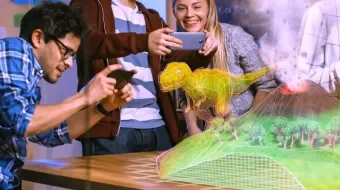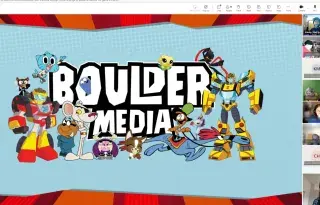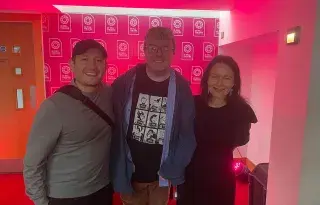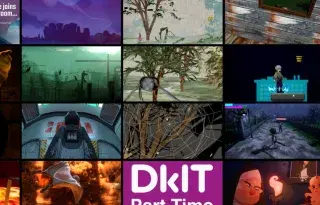MSc in Computing in Games and Extended Reality

Search to find a different course
Course Overview
Designed and taught by staff who are leading experts in their fields, this Master's degree in Games and Extended Reality at DkIT aims to provide graduates with the knowledge, skills and competencies to design, develop and evaluate games and immersive user experiences with virtual (VR), augmented (AR) and mixed reality technologies. The online flexible mode of delivery allows you to study at times that suit your schedule, from any location (with internet access).
This course will provide graduates with the necessary technical knowledge and transferable skills to work in a variety of roles within the industry including Game Engine Developers, Programmers, 3D Artists and AR/VR Developers.
It has been developed with the support of a range of companies and organisations working in the field of games development and immersive technologies.
What makes this course different
Study from anywhere, this course is delivered 100% online
This is a conversion course so ideal for anyone with an unrelated level 8 qualification looking to transition to the Games Development or Extended Reality Industry.
Career Opportunities
Graduates of this course can become a future Game Engine Developer, Programmer, 3D Artist or AR or VR Developer.
Course Delivery and Modules
This course will run online over 3 nights per week for 4 semesters with classes taking place in the evenings between 6 pm and 10 pm as follows:
- Tuesday 6pm-10pm,
- Wednesday 6.30pm to 8.30pm
- Thursday 6.30pm to 8.30pm
(subject to change)
Course taught using an online learning approach, this course provides a balanced learning experience that is both a structured and flexible learner experience for students which makes it ideal for students in active employment.
- Software Engineering
- 3D Animation and Game Engine Pipeline
- Extended Reality Theory
- Data Analytics for Computer Graphics
- Software Engineering
- 3D Animation and Game Engine Pipeline
- Narrative Scene Composition and Prototype
- User Experience Design in Immersive Technologies
- Software Engineering
- 3D Animation and Game Engine Pipeline
- Research Skills for Product Development
- Sound Design for Immersive Technologies
- Final Project
Fees and Funding
EU Fees:
- Full-time (EU): n/a
- Part-time (EU): €940
Non-EU Fees:
- Full-time (EU): n/a
- Part-time (EU): n/a
Fees
Entry requirements
A minimum Second-Class Honours (2.2) in Level 8 Computing from a recognised third level institution, or equivalent qualification in a cognate discipline OR A minimum Second-Class Honours (2.2) Higher Diploma in Science in Computing (or similar) Level 8 award.
Technology Requirements:
Applicants must have at least this level of spec (see below) to be able to complete these courses.
- Operating System: Windows 10 64 bit.
- CPU/ Processor:
- Quad-core Intel or AMD 2.5 GHz or faster.
- 64-bit Intel or AMD with SSE4.2 instruction set.
- Memory: 8 GB Ram (Min) 16 GB or more recommended
- Graphics/Video Card:
- Direct X 11 or 12 Compatible Graphics Card
- Direct X 11/12: Latest drivers
- Vulkan:AMD (21.11.3+) and NVIDIA ( 496.76+)
How to apply
Apply Directly to DkIT
Apply directly to DkIT using our online applications system. Please remember to upload the required documentation (copies of your existing qualification(s), your CV, any other support documents etc) with your online application to expedite your application. To avoid disappointment early registration is recommended.
Ask us a Question
If you have a question about the MSc in Computing in Games and Extended Reality please ask it below and we will get back to you.
Department Office
Disclaimer: All module titles are subject to change and for indicative purposes only. All courses are delivered subject to demand and timetables are subject to change. Elective Module options will only run subject to student numbers. The relevant Department will determine the viability of each elective module option proceeding depending on the number of students who choose that option. Students will be offered alternative elective modules on their programme should their preferred elective option not be proceeding. Award Options for Common Entry Programmes: The relevant Department will determine the viability of each award option proceeding depending on the number of students who choose either option. If the numbers for one of the Award options exceed available places, students for this option will be selected based on Academic Merit (highest grades).


